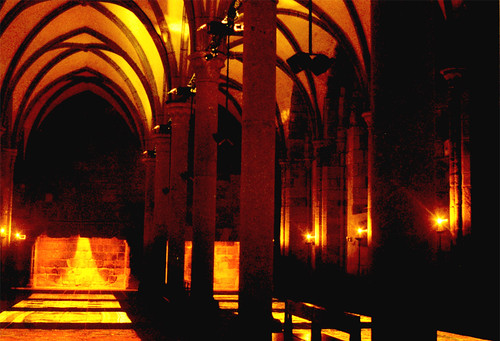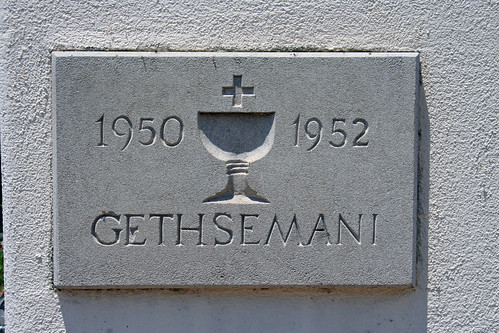The Seven Storey Mountain, by Thomas Merton
Rating: 




I found a place that I hoped would be obscure, over on one side, in the back, and went to it without genuflecting, and knelt down. As I knelt, the first thing I noticed was a young girl, very pretty too, perhaps fifteen or sixteen, kneeling straight up and praying quite seriously. I was very much impressed to see that someone who was young and beautiful could with such simplicity make prayer the real and serious and principal reason for going to church. She was clearly kneeling that way because she meant it, not in order to show off, and she was praying with an absorption which, though not the deep recollection of a saint, was serious enough to show that she was not thinking at all about the other people who were there.
What a revelation it was, to discover so many ordinary people in a place together, more conscious of God than of one another: not there to show off their hats or their clothes, but to pray, or at least to fulfill a religious obligation, not a human one.
That’s Thomas Merton writing about the first time he went to Mass at about the age of 20. It reminded me quite a bit of my first Latin Mass. He wasn’t Catholic at that point, and I wasn’t a very good one, but I too remember sitting in the last pew and being impressed by the silence, the seriousness, and the reverence that people showed.
I’ve been wanting to do more spiritual reading and I’ve seen a lot of recommendations for this book, so I thought it might be a good one to start with. It’s the autobiography of a man who seemed to have it all by conventional standards: enough family wealth that he could travel the world and live pretty much how he liked. He’d spend a year in college, then live as a tourist in Rome for a while, then pop over to America to live with his grandparents and explore New York. But as the years passed, he felt more and more that something was missing, and eventually realized that something was God. This is his story of that journey from misspent youth to baptism and faith, and eventually to becoming a Trappist monk and priest. (I don’t think that’s too much of a spoiler, since there’s a picture of him in his robes on the back of the book.)
One thing I like about his story is that it was a gradual process. We hear a lot about big explosive conversion experiences, like Paul on the road to Damascus, where someone gets whapped upside the head by God and lives a saintly life thereafter. That’s great, but I suspect it’s hard for most people to relate to. It is for me anyway. Merton, on the other hand, comes to the faith little by little. First he’s simply awed by the churches and cathedrals of Europe, but as someone who was raised to think Catholics were somehow diabolical, he never paid much attention to what went on in them.
When he is baptized, it’s clearly a very meaningful event for him, but it doesn’t really change his lifestyle much. He’s still mostly partying with his college drinking buddies and basically cruising through life. But he starts to pray more, to attend Mass more often, to read spiritual works, and eventually he somehow finds himself thinking about becoming a priest.
Even then it’s not an easy path, as he assumes his sinful past will disqualify him for the priesthood or religious life, and in fact it does cause the Fransiscans to reject him when he first applies to join them. But over time his unhappiness at the thought of never being able to enter the religious life makes him realize it is his true calling, and he joins the Trappists at Gethsemani Abbey in Kentucky.
It’s encouraging to read about his stops and starts, to see that someone could go to Mass on Sundays and be too much “in the world” on weekdays; but that by persevering and working on it, he could gradually build his faith to deeper and deeper levels. If we don’t hear God’s call (or hear it and reject it, more likely), He doesn’t stop calling. No matter how many times we say “I can’t” or “I won’t,” it’s never too late for us to shape up and listen.
On a historical note, one interesting thing about this book is that, if it didn’t have any dates, you’d probably think Merton was growing up in the 60s and 70s rather than the 1930s. He spends a good part of his twenties hanging out at colleges like Cambridge and Columbia with a bunch of other intellectual types, hitchhiking around Europe to see the sights, letting his hair and beard grow long, becoming a Communist for a while, and just taking it easy. He was like a 60s hippie prototype, 30 years before his time! It goes to show those things weren’t invented in the 60s; they just became more popular then.
Anyway, it’s a very good book. He’s pretty quiet about the actual details of his sordid past, but that’s probably appropriate. There’s often a fine line between relating those things for educational purposes and bragging about them. When he starts riffing on God’s grace and divine love, on the other hand, sometimes he’s downright poetic. The book ends soon after he’s accepted into the monastery, so it doesn’t go into the Trappist life much. I’ll have to see if he wrote any more books that cover that.
If you enjoyed this article, why not rate it and share it with your friends on Twitter, Facebook, or StumbleUpon?
loading...


